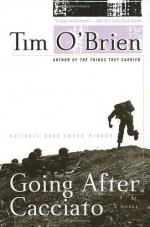|
This section contains 8,203 words (approx. 28 pages at 300 words per page) |

|
SOURCE: "A Walk through History: Tim O'Brien's Going after Cacciato" in War, Literature, and the Arts, Vol. 3, No. 1, Spring, 1991, pp. 1-34.
In the essay below, Griffith explicates the meanings of both the characters' actions and the narrative's events in Going after Cacciato by situating them in their historical context.
Going After Cacciato, Paul Berlin's surname would (or used to) suggest that he is a soldier divided against himself. His immediate circumstance finds him on watch duty atop an observation post at Quang Ngai, Vietnam, from midnight to six a.m. in late November 1968. It is "a bad time," for several of his comrades have been lost. Unmentioned is the frightful history of the year: the Tet offensive and siege at Khe Sanh, the massacre at My Lai, the assassinations of Martin Luther King, Jr. and Robert Kennedy, the riots in Chicago during the Democratic convention, and, finally, the...
|
This section contains 8,203 words (approx. 28 pages at 300 words per page) |

|


